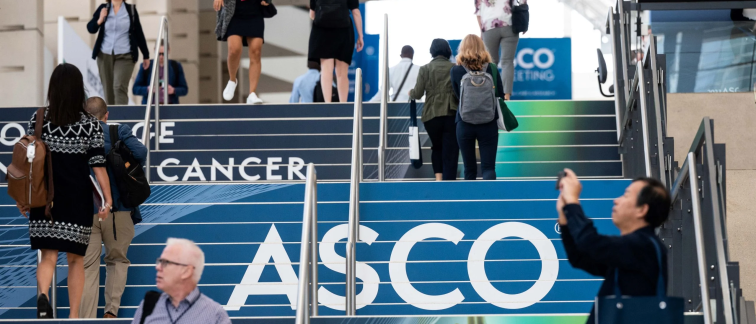At the 2023 American Society of Clinical Oncology (ASCO) Annual Meeting (June 2-6), an international team of researchers that included Prof. Marie-José Kersten (Cancer Center Amsterdam) announced that that axicabtagene ciloleucel (axi-cel), a chimeric antigen receptor (CAR) T-cell therapy, significantly improved survival rates in patients with early relapsed or refractory large B-cell lymphoma. The study results were published in The New England Journal of Medicine
After a median follow-up of 47.2 months, the axi-cel treated patients demonstrated an estimated 4-year survival rate of 54.6%, compared to 46% in the standard care group. Progression-free survival was also significantly improved, with a median progression-free survival of 14.7 months compared to 3.7 months with the standard therapy. In addition, the quality of life for patients treated with axi-cel improved faster than those treated with the current standard-of-care chemotherapy. Axi-cel's safety profile was manageable and consistent with previous trials.
The researchers hailed this breakthrough as 'a first in nearly three decades’ that significantly improved overall survival with axi-cel as a second-line curative therapy. “The results from the ZUMA-7 trial show that we are moving to an era where CAR T-cell therapies, like axi-cel, are not just alternative treatments, but potentially superior choices,” says Prof. Marie-José Kersten.
For the next clinical research phase, the ZUMA-23 clinical trial is currently enrolling patients to evaluate axi-cel as a first-line therapy compared with chemotherapy.
What is Axi-cel?
Axicabtagene ciloleucel, also known as axi-cel, is a type of immunotherapy known as chimeric antigen receptor (CAR) T-cell therapy.
CAR T-cell therapy is a type of treatment that uses a patient's own immune cells to fight cancer. T cells, a type of white blood cell, are removed from a patient's blood. Then, in the lab, a special receptor called a chimeric antigen receptor (CAR) is added to the T cells. This receptor allows the T cells to recognize and attach to a specific protein on the patient's cancer cells.
In the case of axi-cel, the CAR T cells are engineered to bind to a protein called CD19, which is found on the surface of B cells, including B-cell lymphomas. Once the T cells are modified, they are multiplied in the lab and infused back into the patient. These engineered T cells can now seek out and destroy cancer cells expressing the CD19 protein.
While axi-cel can be a powerful tool in the fight against cancer, it can also have severe side effects, such as cytokine release syndrome (a systemic inflammatory response that can cause high fever, fatigue, and even organ failure in severe cases) and neurologic events.
For more information, contact Prof. Marie-José Kersten, or read the publication here:
Jason R. Westin, J.R., Oluwole, O.O., Kersten, M.J., et al. (2023) Survival with Axicabtagene Ciloleucel in Large B-Cell Lymphoma. New Engl J Med. https://doi.org/10.1056/NEJMoa2301665
Disclosure: The trial was funded by Kite Pharma, a Gilead Company. For full disclosures of the study authors, visit coi.asco.org.
Text by Laura Roy.
This article was created for Cancer Center Amsterdam.
© 2023 New Haven Biosciences Consulting – All rights reserved.

